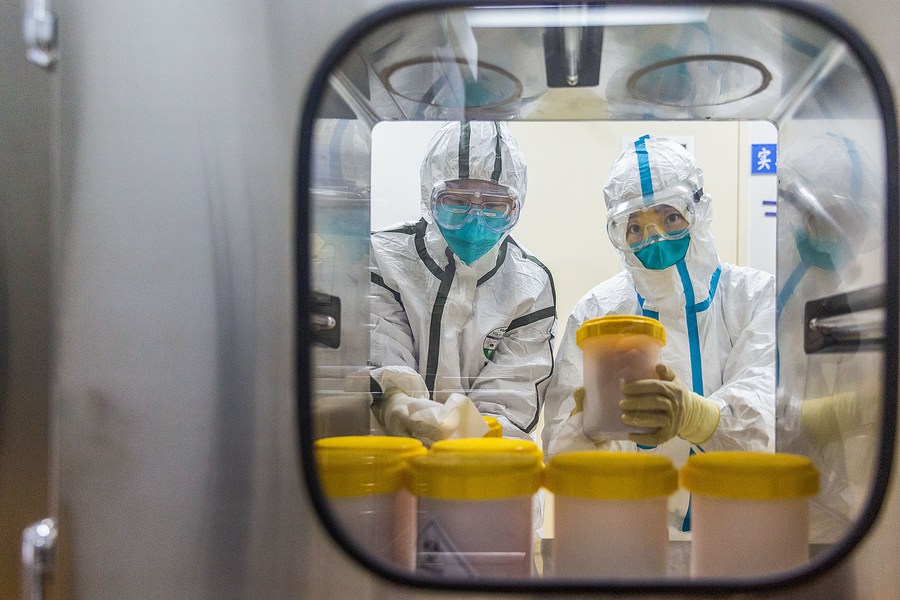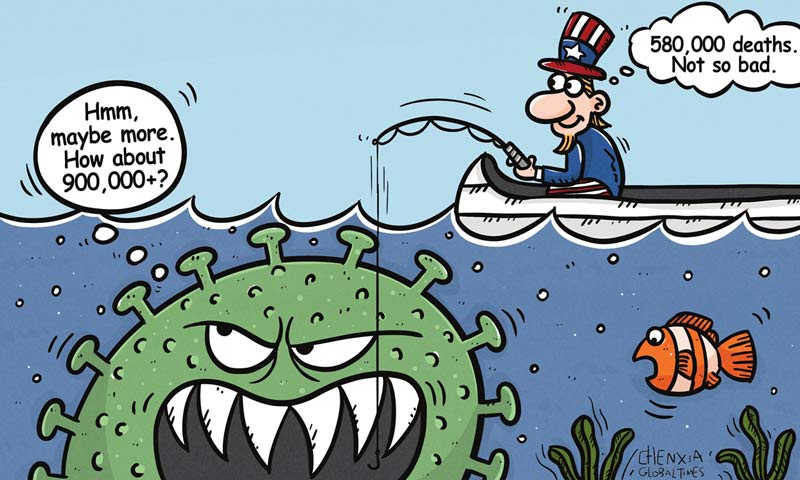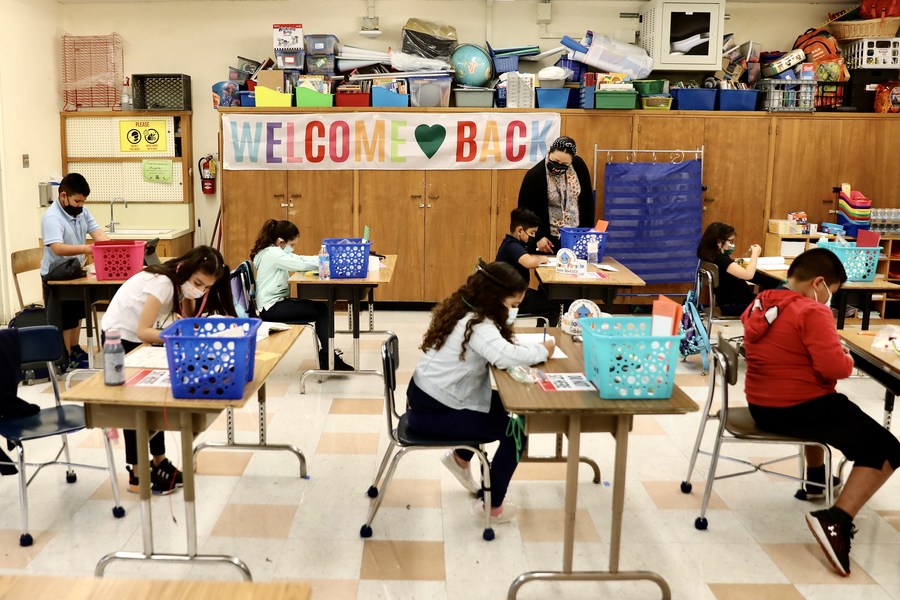One world, two systems: How China and U.S. deal with derelict officials during COVID-19

Staff members receive the novel coronavirus strain transported from Zhejiang Provincial Center for Disease Control and Prevention, at a laboratory of Chinese Center for Disease Control and Prevention, in Beijing, capital of China, Feb. 25, 2020. (Photo by Liu Peicheng/Xinhua)
On August 7, some 15 officials in the epidemic-stricken city of Nanjing, east China's Jiangsu Province were punished for their slack response and ineffective management when dealing with the latest COVID-19 outbreak at Nanjing Lukou International Airport that later spread to several provinces across China.
The long list of those who were meted out punishments included Hu Wanjin, a vice mayor of Nanjing. He was given an administrative demerit for ineffective management and supervisory responsibilities for the city's epidemic prevention and control. Fang Zhongyou, the head of the Nanjing health commission, was removed from his post for poor performance.
Wang Chao, deputy general manager of Eastern Airports Group, who had led the foreign-related epidemic prevention and control work at the local airport, was put under investigation and into detention for suspected negligence and disregard for his duties, behavior that has caused "heavy losses and [an] extremely bad influence."
The announcement was welcomed by the public, with many asking for stiffer punishments. "An incompetent general keeps the whole army at bay," one netizen wrote on Weibo, a Chinese microblogging platform, referring to the seriousness of dereliction that caused the spike in sporadic COVID-19 cases across the country. "They must be punished severely to warn others," the netizen further commented.
Since the latest round of outbreaks on July 20, China has penalized a great number of officials in the epidemic-hit provinces. Punishing officials for failing to swiftly contain the COVID-19 outbreak has become a stock-in-trade in China. A day after Zhengzhou, central China's Henan Province reported its first confirmed cases on July 31, the city announced disciplinary actions against officials and personnel who were negligent in carrying out their duties, including the director of the health commission of Zhengzhou City and those at the city's No. 6 People's Hospital where infections were discovered.

Medical workers wait to submit COVID-19 samples for nucleic acid test at the center for disease control and prevention in Fengman District of Jilin City, northeast China's Jilin Province, May 17, 2020. (Xinhua/Yan Linyun)
"Punishing officials responsible for the loopholes now serves as a reminder to their peers that they should always implement people-centered principles throughout the anti-pandemic battle and remain vigilant to protect people's safety and livelihoods," said Li Haidong, professor at the Institute of International Relations at the China Foreign Affairs University, to People's Daily Online.
"The punishments, which have been applauded by the public, are essential and effective as they embody the country's seriousness for its COVID-19 containment measures," said Diao Daming, a researcher at the National Academy of Development and Strategy, Renmin University of China in an interview with People's Daily Online.
"In the face of previously unknown coronavirus cases, a zero-tolerance approach towards any mishandling is truly indicative of a prioritization of people's interests and lives and respect for science, which indicates a sense of responsibility for the Chinese people," he added.
Mad kings of the COVID-19 era
Across the Pacific, officials from the other major world power - the United States - seem to be luckier than their Chinese counterparts as their nation is now inured to its cascading COVID-19 failures. Since the outbreak began, ZERO U.S. officials have been punished or made to step down due to their mishandling of the COVID-19 pandemic. Under such a loose political environment, it's no wonder that U.S. politicians can still rest easy, or worse, go about hamstringing their own people's efforts to fight against the pandemic.

Illustration: Chen Xia/GT
The COVID-famous New York state governor, Andrew M. Cuomo, who has been dubbed as "America's governor" for how he handled the earliest wave in the pandemic, sent more than 9,000 recovering coronavirus patients back to nursing homes early on during the pandemic, according to the Associated Press. The jaw-dropping directive signed by Cuomo, which aimed to downplay the seriousness of the pandemic has resulted in life-and-death consequences that helped to further spread sickness and death upon residents living in nursing homes who were among the most vulnerable victims amid the growing pandemic.
The nursing home scandal kindled the public's outrage towards his administration's handling of recurrent outbreaks and cut to the heart of Cuomo's reputation as a pandemic hero. However, has Cuomo been held accountable for his public heath malpractice? In one word: NO. More than a year after his notorious directive that might have fueled an uptick in fatalities in nursing homes throughout his state, the U.S. Justice Department announced on July 24, 2021 that it will not be conducting a civil investigation into Cuomo's misconduct. Cuomo even declined to apologize for his administration's decision , insisting that they followed the guidance of federal agencies .
Ironically, governor Cuomo has done better than almost any other U.S. state governor at containing the outbreak. At least he implemented all possible strategies once he got the fire lit under him, despite his mistake-filled early response. Some politicians in the U.S. suddenly turned into "the mad kings of the COVID-19 era" who could do nothing else but cause panic and chaos at all times.

Students attend an in-person class in a school in Los Angeles, California, the United States, on April 13, 2021. (Photo/Xinhua)
Florida governor Ron DeSantis is one of them. DeSantis, who has been firmly opposed to any pandemic restrictions, recently waged a battle seeking to put a ban on the mask mandate as the contagious and virulent Delta variant continued to engulf his state across the state map. He banned the mask mandate in schools just weeks before students were set to go back to school and threatened to withhold paychecks from school leaders that did not comply with the order. This is not his first time that the state authorities ran afoul of the current guidance from the U.S. Centers for Disease Control and Prevention (CDC). On August 5, DeSantis objected to vaccine mandates at Florida hospitals and three months earlier, he signed a piece of legislation that sought to place a ban vaccine passports.
Netizens on Reddit crowned him as "the nation's worst COVID governor" as his reckless approach to COVID-19 has pushed his state back into the grip of the pandemic once again. The proof is in the pudding: Florida continues to break records for numbers of new COVID-19 cases, registering 25,991 daily cases on August 15; with the case rate in the state having meanwhile jumped by 60 percent over the past two weeks.
Texas governor Greg Abbot is also in the running for "the worst COVID governor" prize as he moved to forbid local governments from imposing vaccine and mask requirements. Even as his state now grapples with a COVID-19 surge and appeals for outside help, he is nonetheless continuing to fight aggressively in court to uphold his statewide ban on local mask mandates.
The politician's dereliction of duty has indirectly claimed lives and has destroyed families, and yet the question remains: Has he faced any punishments or has he expressed even the slightest whiff of a guilty conscious for the plight of Texans? Answer: NO. The state's political helmsman, nor his boosters in seats of power, need not bear any responsibility for their blunders during the pandemic. Instead, they continue to whimsically spew forth their anti-science rhetoric that can only serve to further plague the nation.
Ingrained system defects?
"The U.S. political system features the decentralization of responsibility, which provides a perfect excuse for a politician to shirk their responsibilities as they can always find someone to shift blame onto," said Li.
The U.S. federalist system of government has divided up the country's powers between governments in U.S. state capitols and the federal government in Washington, D.C., which has often led to buck passing and uncertainty regarding personal liability during the pandemic. Pointing fingers back and forth between states and federal governments over anti-pandemic restrictions, PPE supplies, and vaccine distribution have often made headlines. The two-party electoral system also generates the exact same problems. Since the COVID-19 outbreak took hold in the country, the quarrel over who should be held accountable for the containment failure has never ended, with both sides claiming that the opposing party was sabotaging their containment efforts.
"This leads to an American political tragedy where U.S. politicians always scamper about to claim credit, while no one meanwhile takes any responsibility for failures," said Li.

Illustration: Liu Rui/GT
With no one to blame becoming a systemic defect that is now a feature of the American political establishment, this has in turn led to the unscrupulous oversight and ineptitude that has characterized the country's attempts at carrying out epidemic control and prevention. Moreover, other system-wide defects have likewise cropped up and continue to play their own part in the spectacle that is American politics.
U.S. politicians are willing to put their people at risk to gain personal political advantage since "the priority of U.S. politicians is to secure their second terms and protect their party and interest groups, and not to safeguard their people's right," said Diao.
This can explain the widespread and bizarre political farce that has taken place amid the pandemic. To distance themselves from the federal capital, some politicians have opted to flout scientific and medical advice by lifting containment measures in the middle of the pandemic. Some who have indulged in factionalism take every opportunity to run counter to the orders issued by the opposite party. "U.S. politicians are irresponsibly insouciant about the raging pandemic since their poor performance has only a slight impact on their own political interests," said Sun Chenghao, an assistant researcher at the Center for International Security and Strategy, Tsinghua University.
Most politicians will face their reckoning at the ballot box in the next election, which often comes two or four years later. "One of the deficiencies of the electoral system is its hysteresis quality, which leads to a poor error correction capability," said Sun. Even though electorates show growing signs of disaffection, they cannot dismiss officials immediately. In the next election term, their misconduct will have been downplayed by that time or outshone by the latest crisis. Hence their reckless leadership style won't force them to step down during their current tenure or lead to their loss in a second term.
"That's why the officials can flagrantly screw up epidemic prevention and control," said Diao. "The ingrained systemic defects of the U.S. breeds malfeasance, which directly causes endless pain to its people."
"Drawing a parallel line between China and the U.S. on their responses to derelict officials is in vain as the U.S. doesn't have any mechanism to hold officials accountable for their failures on containing the virus," said Diao.

A pedestrian walks past a COVID-19 vaccine inoculation billboard in New York, the United States, July 26, 2021. (Xinhua/Wang Ying)
One of the stark differences between China and the U.S. is the governing ideas of the ruling party. In the U.S., the ruling party is working on behalf of its own interest groups, power groups or a privileged stratum. While the leading party in China, the Communist Party of China, has no special interests of its own and always represents the fundamental interests of all Chinese people. Since the founding of the CPC a century ago, China has, in the face of all foreign aggressions, external interferences and disturbances, found a distinctive path in its people-centered principle: serving the public good, and exercising power in the interests of the people.
This people-centered principle has sprinkled into every step of the country's anti-pandemic work, which is one of the key factors for successfully controlling the pandemic. Since the onset of the pandemic, China, insisting that the rights to subsistence and development are primary fundamental human rights, has been putting the lives and health of its people front and center. Compared to the U.S., which values capitals more than its people, China has placed people's lives even above economic growth. When the virus struck, China took strict and comprehensive control measures even at the cost of a short-term economic downturn and a temporary shutdown in the affected coronavirus-hit cities. Nothing is more precious than people's lives.
"To safeguard its people, China has developed a mature anti-pandemic mechanism with clear rights and responsibility," said Li. "So the government can discover the loopholes and the misconducts and immediately reduce the losses of people and save lives."
"Any officials who neglect their duties and cause damage to the public during the anti-pandemic fight would be punished as they set aside the people-centered principle during their work," said Diao. "If government officials cannot serve its people, they would be replaced by a competent counterpart."
"Punishments for misconduct incarnates the Chinese government's responsibility toward its people," said Diao.
Photos
Related Stories
- Chinese mainland reports 5 new locally transmitted COVID-19 cases
- China right to stick to anti-pandemic strategy amid Delta variant surge: media
- Global new cases of COVID-19 keep rising in last two months: WHO
- 3 asymptomatic cases in China's Xinjiang infected with Delta variant
- Zhengzhou supplies TCM for COVID-19 prevention and control
Copyright © 2021 People's Daily Online. All Rights Reserved.










